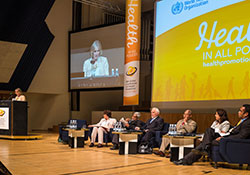Progress in bringing health into all policies

Ministry of Social Affairs and Health, Finland
On the final day of the 8th Global Conference on Health Promotion, 14 June 2013, participants recognized the need for the health-in-all-policies approach to be central to the development agenda of countries, regions and cities. For the WHO European Region, this approach is an integral part of developing Health 2020 plans in countries.
Speaking on that day, Zsuzsanna Jakab, WHO Regional Director for Europe, explained how equity and the health-in-all-policies approach are key components of the European health policy framework, Health 2020. Noting countries’ differing capacities to move forward with the principles of the approach, Ms Jakab concluded, “We want to see Europe develop a truly whole-of-society approach to promote equity and improve governance for health.”
Europe Day
The last day of the Conference, Europe Day, was dedicated to showcasing national and subnational experience from the Region.
Sessions covering the life-course approach to health, better governance, noncommunicable diseases and their risk factors, the environment, tackling inequalities, and work and health delivered the following key messages.
- Improved monitoring of child health is needed, with common indicators.
- Gender differences in ageing require further analysis.
- Implementing the health-in-all-policies approach requires sufficient people, an engaged civil society and consistent, coordinated policy-making.
- Comprehensive legislation is a breakthrough in tobacco control, but vigilance is needed to monitor industry’s response.
- Complex public health problems, such as obesity, require complex solutions, such as active transport, which provides multiple and measurable health benefits.
- Policy-making on pricing, marketing and availability are the best ways to address alcohol misuse, but this requires international cooperation.
- In the workplace, multitasking is a health risk; time for action, idling, resting and recovering is important.
- Being healthy at work means having a longer working life.
- Salt consumption is very high in the European Union. Effective strategies to reduce it exist, and should focus on effective monitoring, reformulation of foods? and population awareness.
- Trends in mortality from cardiovascular diseases (CVD) reflect the impact of economic growth, recession and austerity policies. Cross-sectoral policies that address CVD, such as salt reduction, can affect mortality rates fast.
Lifetime Achievement in Health Promotion
On Thursday, 13 June 2013, Dr Kimmo Leppo, former Director-General of the Health Department at the Ministry of Social Affairs and Health in Finland, was presented with a Lifetime Achievement in Health Promotion award, in recognition of his role one of the founding fathers of the health promotion movement.
Dr Leppo was a member of the WHO Executive Board when the strategies for primary health care and Health for All were drafted in the 1970s. He drafted the world’s first truly comprehensive government bill for tobacco legislation in Finland in 1976, and he was responsible for the preliminary drafting of the Finnish Health for All strategy in the early 1980s.
Since retiring Dr Leppo has continued his professional career as both an international consultant and an author of scientific work on health policy.



